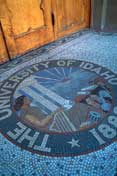Guidelines & Instructions
The ID/JRJ Program provides educational loan repayment benefits to prosecutors and public defenders in Idaho (ID), using funding from the John R. Justice (JRJ) Program. The purpose of the program is to encourage qualified attorneys to choose careers as prosecutors and public defenders and to continue in that service.
JRJ Grant Guidelines
- Amount of Program Funding and Benefit Amount
The ID/JRJ Program will be awarded federal funds during the period of October 1, 2017 – September 30, 2018. Each beneficiary may receive a maximum of $6,000 depending on demonstrated need. A beneficiary may not receive more than $60,000 in total lifetime benefits provided by JRJ grant funds. - Eligibility
- Eligible Employment
The definitions of prosecutors and public defenders that are in employment eligible for benefits from the ID/JRJ Program are below:
Prosecutor – A full-time employee of a state or unit of local government (including tribal government) who is continually licensed to practice law and prosecutes criminal or juvenile delinquency cases at the state or unit of local government level (including supervision, education, or training of other persons prosecuting such cases). 42 U.S.C.§3797cc-21(b)(1). Bureau of Justice Assistance policy bars elected prosecutors from benefiting from this program.
Public Defender – An attorney who is continually licensed to practice law and is a full-time employee of a state or unit of local government (including tribal government) who provides legal representation to indigent persons in criminal or juvenile delinquency cases including supervision, education, or training of other persons providing such representation; is a full-time employee of a nonprofit organization operating under a contract with a state or unit of local government who devotes substantially all of the employee’s full-time employment to providing legal representation to indigent persons in criminal or juvenile delinquency cases including supervision, education, or training of other persons providing such representation; or employed as a full-time federal defender attorney in a defender organization pursuant to Subsection )(g) of section 3006A of Title 18, United States Code, that provides legal representation to indigent persons in criminal or juvenile delinquency cases. 42 U.S.C. §3797cc-21(b)(2).
Ineligible employment: Prosecutors who are employees of the federal government are ineligible. Attorneys who are in private practice and not a full-time employee of a non-profit organization, even if individually or part of a firm that is under contract with a state or court appointed to provide public defense services, do not qualify as “public defenders” and therefore are not considered to be eligible. All applicants MUST have been eligible for this award in September 2017. - Other Eligibility Requirements
- A beneficiary must be employed in the state from which s/he receives JRJ funding.
- A beneficiary must be employed full-time, which is not less than 75 percent of a forty hour work week.
- A beneficiary must be continually licensed to practice law.
- A beneficiary must not be in default on repayment of any federal student loans.
- A beneficiary must have a Modified Adjusted Gross Income (MAGI) of $75,000 or less.
- Staff will evaluate eligibility based on the programmatic criteria set forth by the U.S. Department of Justice and existing ID guidelines. This formula will determine the applicant’s “ability to pay” his/her student loans and accounts for salary differences, domestic partner income, out of pocket deductions and dependents. See the JRJ Student Loan Repayment Program (JRJSLRP) Service Agreement for other eligibility requirements.
- Eligible Student Loans
The following loans are eligible for repayment with JRJ funds:- A loan made, insured, or guaranteed under part B of subchapter IV of chapter 28 of Title 20 (Federal Family Education Loan Program);
- A loan made under part C or D of subchapter IV of chapter 28 of Title 20 (William D. Ford Federal Direct Loan and Federal Perkins Loans);
- A loan made under section 1078-3 or 1087e(g) of Title 20 (Federal consolidation loans and Federal Direct Consolidation loans, respectively)
- Eligible Employment
-
Application Procedure
Applicants must submit an application packet by Aug. 20, 2018. Email your materials to Sunil Ramalingam at JRJGrant@uidaho.edu
An application packet includes the application, employer verification form, loan account statement(s) and a signed service agreement. -
Selection of Beneficiaries
The total amount of benefits funded with JRJ funding will be equally divided between prosecutors and public defenders.
Within the two employment categories, priority will be given to those attorneys who have the least ability to repay their student loans. The methodology that will be used to assess an applicant’s ability to repay their student loans will be to consider the ratio of an applicant’s total eligible educational debt to an applicant’s Modified Adjusted Gross Income (MAGI). The minimum ratio needed to receive benefits will be determined after all applications are received and the numbers of applications is compared with the total amount of funding available. Awards will distributed to those least able to repay their loans, but will be spread among geographic and population density to ensure that funding is not isolated or heavily concentrated in any particular metropolitan area or geographic section of the state. Widespread distribution between rural and urban areas and amongst all quadrants of the state will be ensured. -
Service Agreement
Attorneys selected to receive assistance must sign a service agreement with the U.S. Department of Justice. The service agreement obligates a beneficiary of 2016-2017 JRJ funds to “remain employed as a prosecutor or public defender for a period of service of not less than three years (36 months) unless involuntarily separated from employment.” Two Service Agreements are attached to these guidelines and should be carefully read for notice all of the agreements between beneficiaries and the U.S. Department of Justice. First-time applicants must sign a three-year agreement. Repeat beneficiaries must sign the one-year agreement.See Appendix C (p. 27/32 at this link: https://www.bja.gov/Funding/16JRJGuidance.pdf
for the one-year agreement.
-
Benefits Distribution
ID/ JRJ Program will pay the awarded benefits in one lump sum payment to the lender of the beneficiary’s loan(s). The amount paid will not exceed the total qualifying loan balance. ID/ JRJ Program will not be held responsible for any late fees assessed by the lending institution. If the beneficiary has more than one eligible loan, s/he will indicate on the application the loan for which the ID/ JRJ Program should make the quarterly payments. -
Taxability
Loan payments made through the ID/JRJ Program on behalf of beneficiaries may be taxable and subject to withholding. -
Renewal of Benefits for 2016-2017 Beneficiaries
Once approved for loan repayment, there is a rebuttable presumption that a beneficiary will be given priority consideration to receive funding during the second and third years of the three-year service agreement, depending on the availability of funds. Renewal is not automatic and nothing shall obligate ID/JRJ Program to renew a benefit in the same (or greater) amount previously received by a beneficiary. -
Changes in Beneficiary Employment
Beneficiaries who change jobs, but remain in continual, eligible employment in Idaho will continue to be eligible for current or renewed benefits to the same extent as those who did not change employment. -
Contact Information
For more information about the Idaho JRJ Grant Program, contact
University of Idaho College of Law
875 Perimeter Drive, MS 2322
Moscow, Idaho 83844-2322
email: JRJGrant@uidaho.edu
phone: 208-885-6541
- Amount of Program Funding and Benefit Amount
The ID/JRJ Program will be awarded federal funds during the period of October 1, 2016 – September 30, 2017. Each beneficiary may receive a maximum of $6,000 depending on demonstrated need. A beneficiary may not receive more than $60,000 in total lifetime benefits provided by JRJ grant funds. - Eligibility
- Eligible Employment
The definitions of prosecutors and public defenders that are in employment eligible for benefits from the ID/JRJ Program are below:
Prosecutor – A full-time employee of a state or unit of local government (including tribal government) who is continually licensed to practice law and prosecutes criminal or juvenile delinquency cases at the state or unit of local government level (including supervision, education, or training of other persons prosecuting such cases). 42 U.S.C.§3797cc-21(b)(1). Bureau of Justice Assistance policy bars elected prosecutors from benefiting from this program.
Public Defender – An attorney who is continually licensed to practice law and is a full-time employee of a state or unit of local government (including tribal government) who provides legal representation to indigent persons in criminal or juvenile delinquency cases including supervision, education, or training of other persons providing such representation; is a full-time employee of a nonprofit organization operating under a contract with a state or unit of local government who devotes substantially all of the employee’s full-time employment to providing legal representation to indigent persons in criminal or juvenile delinquency cases including supervision, education, or training of other persons providing such representation; or employed as a full-time federal defender attorney in a defender organization pursuant to Subsection )(g) of section 3006A of Title 18, United States Code, that provides legal representation to indigent persons in criminal or juvenile delinquency cases. 42 U.S.C. §3797cc-21(b)(2).
Ineligible employment: Prosecutors who are employees of the federal government are ineligible. Attorneys who are in private practice and not a full-time employee of a non-profit organization, even if individually or part of a firm that is under contract with a state or court appointed to provide public defense services, do not qualify as “public defenders” and therefore are not considered to be eligible. All applicants MUST have been eligible for this award in September 2016. - Other Eligibility Requirements
- A beneficiary must be employed in the state from which s/he receives JRJ funding.
- A beneficiary must be employed full-time, which is not less than 75 percent of a forty hour work week.
- A beneficiary must be continually licensed to practice law.
- A beneficiary must not be in default on repayment of any federal student loans.
- A beneficiary must have a Modified Adjusted Gross Income (MAGI) of $75,000 or less.
- Staff will evaluate eligibility based on the programmatic criteria set forth by the U.S. Department of Justice and existing ID guidelines. This formula will determine the applicant’s “ability to pay” his/her student loans and accounts for salary differences, domestic partner income, out of pocket deductions and dependents. See the JRJ Student Loan Repayment Program (JRJSLRP) Service Agreement for other eligibility requirements.
- Eligible Student Loans
The following loans are eligible for repayment with JRJ funds:- A loan made, insured, or guaranteed under part B of subchapter IV of chapter 28 of Title 20 (Federal Family Education Loan Program);
- A loan made under part C or D of subchapter IV of chapter 28 of Title 20 (William D. Ford Federal Direct Loan and Federal Perkins Loans);
- A loan made under section 1078-3 or 1087e(g) of Title 20 (Federal consolidation loans and Federal Direct Consolidation loans, respectively)
- Eligible Employment
-
Application Procedure
Applicants must submit an application packet by Aug. 20, 2018. Email your materials to Sunil Ramalingam at JRJGrant@uidaho.edu
An application packet includes the application, employer verification form, loan account statement(s) and a signed service agreement. -
Selection of Beneficiaries
The total amount of benefits funded with JRJ funding will be equally divided between prosecutors and public defenders.
Within the two employment categories, priority will be given to those attorneys who have the least ability to repay their student loans. The methodology that will be used to assess an applicant’s ability to repay their student loans will be to consider the ratio of an applicant’s total eligible educational debt to an applicant’s Modified Adjusted Gross Income (MAGI). The minimum ratio needed to receive benefits will be determined after all applications are received and the numbers of applications is compared with the total amount of funding available. Awards will distributed to those least able to repay their loans, but will be spread among geographic and population density to ensure that funding is not isolated or heavily concentrated in any particular metropolitan area or geographic section of the state. Widespread distribution between rural and urban areas and amongst all quadrants of the state will be ensured. -
Service Agreement
Attorneys selected to receive assistance must sign a service agreement with the U.S. Department of Justice. The service agreement obligates a beneficiary of 2016-2017 JRJ funds to “remain employed as a prosecutor or public defender for a period of service of not less than three years (36 months) unless involuntarily separated from employment.” Two Service Agreements are attached to these guidelines and should be carefully read for notice all of the agreements between beneficiaries and the U.S. Department of Justice. First-time applicants must sign a three-year agreement. Repeat beneficiaries must sign the one-year agreement.See Appendix C (p. 27/32 at this link: https://www.bja.gov/Funding/16JRJGuidance.pdf
for the one-year agreement.
-
Benefits Distribution
ID/ JRJ Program will pay the awarded benefits in one lump sum payment to the lender of the beneficiary’s loan(s). The amount paid will not exceed the total qualifying loan balance. ID/ JRJ Program will not be held responsible for any late fees assessed by the lending institution. If the beneficiary has more than one eligible loan, s/he will indicate on the application the loan for which the ID/ JRJ Program should make the quarterly payments. -
Taxability
Loan payments made through the ID/JRJ Program on behalf of beneficiaries may be taxable and subject to withholding. -
Renewal of Benefits for 2015-2016 Beneficiaries
Once approved for loan repayment, there is a rebuttable presumption that a beneficiary will be given priority consideration to receive funding during the second and third years of the three-year service agreement, depending on the availability of funds. Renewal is not automatic and nothing shall obligate ID/JRJ Program to renew a benefit in the same (or greater) amount previously received by a beneficiary. -
Changes in Beneficiary Employment
Beneficiaries who change jobs, but remain in continual, eligible employment in Idaho will continue to be eligible for current or renewed benefits to the same extent as those who did not change employment. -
Contact Information
For more information about the Idaho JRJ Grant Program, contact
University of Idaho College of Law
875 Perimeter Drive, MS 2322
Moscow, Idaho 83844-2322
email: JRJGrant@uidaho.edu
phone: 208-885-6541
For more information about the Idaho JRJ Grant, contact Jessica Long email: JRJGrant@uidaho.edu
phone: 208-885-6541
fax: 208-885-4628
University of Idaho
College of Law
875 Perimeter Drive, MS 2322
Moscow, Idaho 83844-2322




